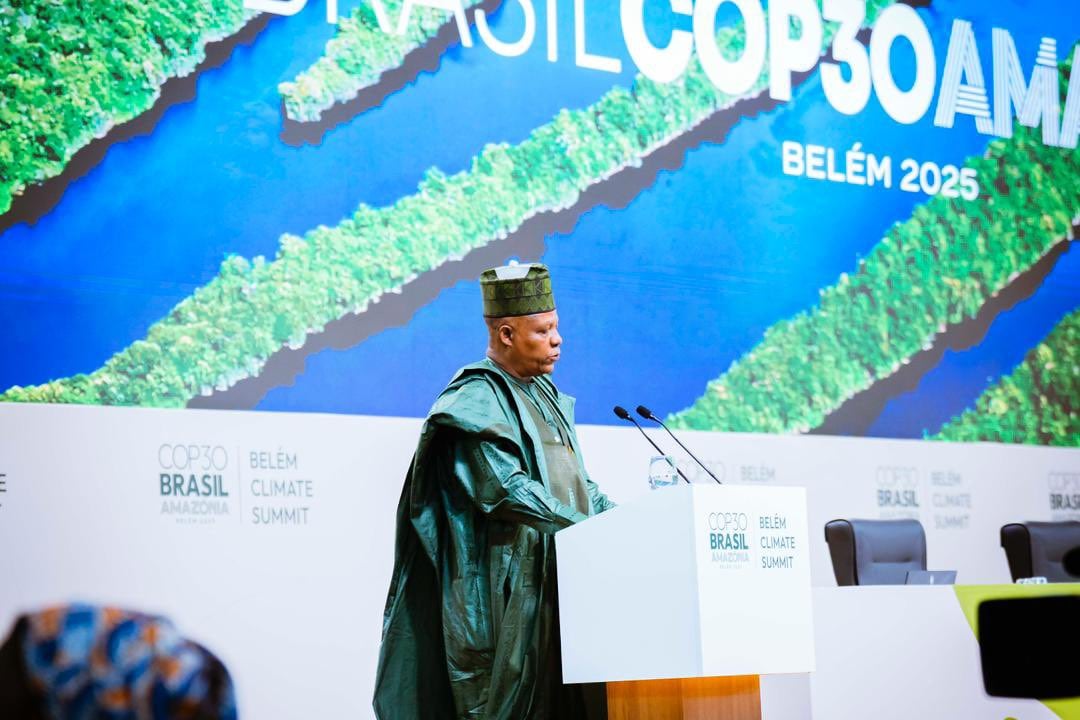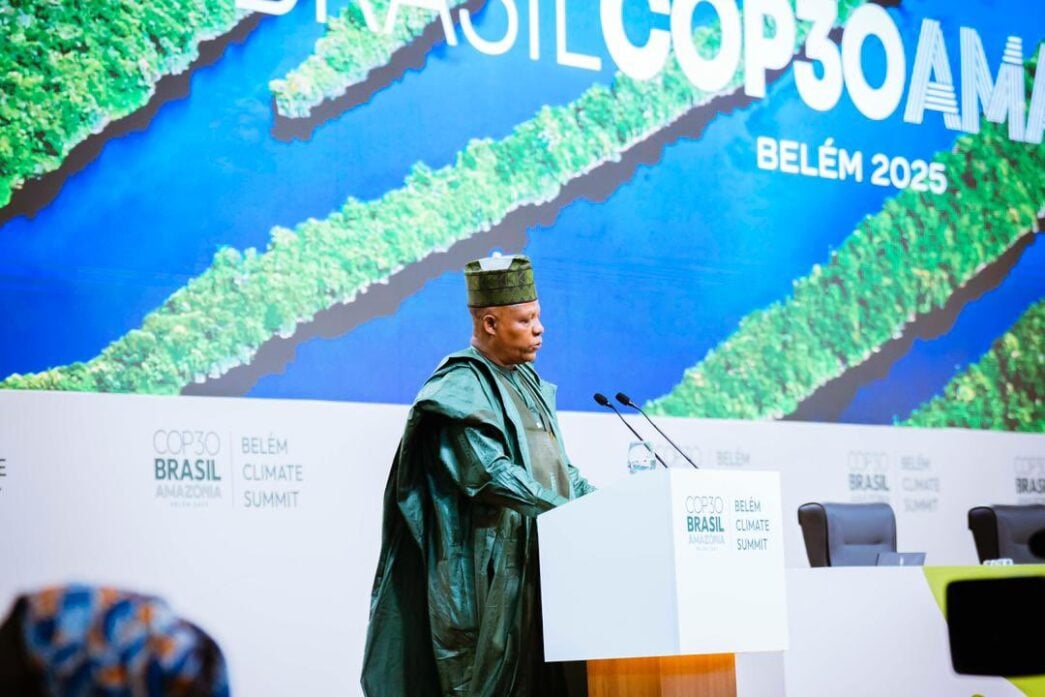At the ongoing 30th United Nations Climate Change Conference (COP30) being held in Brazil from 10 to 21 November 2025, Vice President Kashim Shettima had stressed to the global audience, that Nigeria’s renewed climate agenda was anchored on ‘a solemn national commitment to preserve the planet for future generations’, while urging them to appreciate the economic value of nature, in adopting funding mechanisms for ecosystems restoration and protection that are predictable, accessible and equitable. However, the recent public discord between Nigeria’s Federal Capital Territory (FCT) Minister and Nigerian military officials over a plot of land in Nigeria’s FCT, underscores some of the failures with Nigeria’s conduct that can make development and funding partners skeptical about Nigeria’s commitments to climate and environmental protection.
What then is nexus between Nigeria’s COP30 commitments and the FCT land under contest?
Records from the FCT administration show that the contested land forms part of a contiguous 30 hectares of green space for the Gaduwa district of Nigeria’s FCT, under the management of the FCT Authority’s Parks and Garden department.
Therefore, that a green space which forms a part of Nigeria’s carbon sink ecosystem in the country’s capital is being converted to urban concrete- at a time when the federal government is advocating for more accessible climate due to its compliance with ecosystem protection and environmental restoration at the ongoing COP30 premier UN climate event, is a policy signal that can connote noncompliance with its climate goals, thereby negating the chances of accessing more climate financing opportunities.
Advertisement
Given the huge publicity generated by the altercation at the land site, the event however provides an opportunity for the government to reaffirm it’s pledges made at the ongoing UN COP30 by Vice President Shettima, by publicly restoring the location to a green space- as originally designed. This will signal to climate investors at COP30 in Brazil and across the world, that Nigeria is committed to meeting its climate and environmental obligations.
With Nigeria facing fiscal constraints and budget deficits with its GDP of $243 billion for over 200 million people, accessing investments from the buoyant global climate finance sector, which saw $2. 1 trillion investment in 2024 for low-carbon energy transition according to BloombergNEF, will be a significant economic boost.
From a policy perspective, restoring the area to its green design aligns with the policy objectives of FCT Minister, who had on assumption of office in 2023, identified the restoration green areas and parks as one of his major policy objectives. The minister’s environmental restoration policy was well received at the time, given that Abuja was planned to have 40 percent green cover.
Advertisement
The Minister’s 2023 environmental policy objective was coming on the back of somewhat interesting statements by his predecessor in office, Muhammad Bello. Bello, while handing over at the end of his 2015-2023 tenure as FCT Minister, had warned that the sustainability of Abuja’s environment was at risk. In his words, ‘In the next two years, the Jabi Lake may dry up due to encroachment because once you lose environment, vegetation, and water bodies, it is impossible to regain them’. For a city that bore huge socioeconomic costs especially from 2003-2007 efforts that led to the restoration of its green and efficient status, the fact that a minister who spent 8 years in office will be complaining about threats to the city’s environmental sustainability, situates the hopes expressed when the current minister assumed office.
Utilizing the opportunity of restoring the Gaduwa district green area, the minister and the federal government should also restore major green areas and water bodies in the city that have been built on, such as the popular Zone 6 Berger roundabout greenery, Ministers Hill Maitama, Jabi Lake green area, and the Katampe Extension diplomatic zone. Given the large diplomatic presence in Abuja, such restoration efforts can communicate to the international community through the reports from diplomatic countries to their home countries, that Nigeria is demonstrating clear commitments to environmental and climate protection, and should have increased access to climate investment opportunities. Also, there should be prosecution of land use violators, and approving officials to serve as deterrence to others, and sustain environmental protection.
And there are multilateral climate investment organisations that Nigeria is potentially able to attract more investments from, if the optics are better. They include the Climate Investment Funds (CIF), whose CEO is the Nigerian-American Tariye Gbadegesin. With $12.5B pledged, the CIF is one of the largest active climate finance mechanisms in the world, and is the only climate fund working exclusively through six multilateral development banks (MDBs), with the World Bank Group including the International Finance Corporation (IFC), the African Development Bank (AfDB), the Asian Development Bank (ADB), the European Development Bank (EBRD), and the Inter-American Development Bank, as implementing partners for its climate action projects in over 80 developing countries. CIF has approved funding of $7.7bn,and expected co-financing of $73.1bn consisting of government $9.8bn; bilateral / others $16.8bn; MDBs $23.2bn; and private sector $23.2bn.
CIF is composed of two funds: the Clean Technology Fund (CTF) and the Strategic Climate Fund (SCF), both supporting different programs focused on specific areas of climate action such as Accelerating Coal Transition (ACT) Investment Program;Climate Smart Cities Program; Forest Investment Program (FIP); Industry Decarbonization Program; Nature, People and Climate Investment Program (NPC); Pilot Program for Climate Resilience (PPCR); Renewable Energy Integration Program (REI); Scaling up Renewable Energy Program in Low Income Countries (SREP); and Global Energy Storage Program (GESP).
Advertisement
Though CIF has channeled over USD62 billion in co-financing into climate change mitigation and adaptation in developing countries, Nigeria has just one CIF approved project of $2.1 million funding, with expected co-financing of projects at $75 million. This meagre amount of investment accessed by Africa’s most populous country, underscores the concerns raised by Vice President Shettima about Nigeria’s low access to climate investment at the ongoing COP30 in Brazil, and highlights the need for policy practices and optics that demonstrate a commitment to environmental protection and climate change mitigation, towards attracting investment. Reclaiming green spaces in Abuja will be a good signal.
Beyond the CIF, there are other climate investment opportunities that Nigeria can potentially access, with the right policy approaches and optics. They include the New Collective Quantified Goal (NCQG),which is an investment target agreed to at COP29 of 2024 by countries.The NCQG aims to support developing countries such as Nigeria with climate action post-2025, through a minimum goal of mobilizing at least $300 billion annually by 2035, with developed countries leading the effort. It also includes an aspirational target of mobilizing $1.3 trillion per annum by 2035 from all sources.
The policy momentum from environmental restoration policy actions in Nigeria’s federal capital can cascade to the country’s broader climate and environmental policies such as the Nigeria National Forest Policy 2019. Nigeria has one of the highest rates of deforestation and forest land degradation in the world, averaging 3.5 percent annually. Between 1980 and 1990 the country’s forest area declined from 14.9 million ha. to 10.1 million ha, translating to the loss of 350,000 to 400,000 ha per annum of productive forest land, with forest area further declining to about 6.5 percent of the country’s total land area.
The depletion of the country’s forest area from 11 percent in 2000 to 6.5 percent in 2019 has not only dire environmental, health and socioeconomic implications, but also significantly constrained the country’s national policy goal of increasing the total forest cover to 25 percent by 2020, as part of the Vision 20 20:20. A renewed commitment to climate action will however support the actualization of the Forest Policy 2019 goals of enhancing food and nutrition security, health, improve livelihoods,promote biodiversity conservation and environmental functions of forest ecosystems.it will also support the policy objectives of Nigeria’s National Biodiversity Strategy and Action Plan.
Advertisement
Education teaches importance of climate and environment for human existence and dignified living. Dr. Nnamdi Azikiwe Nigeria first President in establishing the University of Nigeria had the vision of education ‘to restore the dignity of (black) man’. Nigeria should not only see beyond climate goals, but also envision more dignified living. This is more so, at a time when countries such as Indonesia with over 200 million religious demographic group now have fatwa on climate and environmental protection for preservation of green spaces, forests, among others.
As no crisis should be wasted, the current dispute between Nigeria’s federal capital territory Minister and military officials over the 30 hectares of land in Gaduwa district Abuja, should serve as a catalyst for the government to signify Nigeria’s commitment to its climate objectives of preserving the planet for future generations, by restoring the land to a green area- as originally designated in the city’s master plan. The restoration of the Gaduwa green area should provide momentum for the restoration of other green spaces in Nigeria’s capital city and across the country, and serve as a strong signal to the international community currently gathered in Brazil for the United Nations organised COP30, that Nigeria is serious with its climate and environmental policy obligations. Such positive environmental signaling will not only validate Vice President Kashim Shettima’s comments at COP30, but also enhance Nigeria’s chances of accessing more from the over $2 trillion global climate investment market. Given the health and socioeconomic benefits of a preserved environment, the restoration of green spaces not only supports other government policies such as the Nigeria National Forest Policy of 2019 and Nigeria National Biodiversity Strategy and Action Plan, but also enhances the standard and dignity of living in Nigeria.
Advertisement
Uwanaka writes from African University of Science and Technology, Abuja. [email protected]
Advertisement
Views expressed by contributors are strictly personal and not of TheCable.





